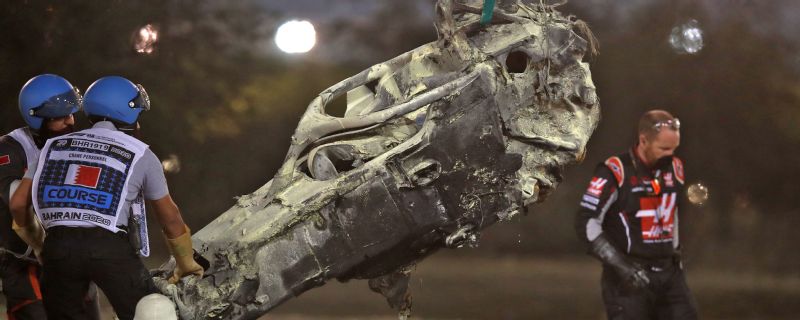The charred remains of the Formula One car Romain Grosjean crashed at the 2020 Bahrain Grand Prix will go on display at a new exhibition in Madrid next month.
Grosjean survived the terrifying accident, which saw his Haas crash into an unprotected barrier at 120mph, split in two and burst into flames.
The French driver spent 28 seconds in the inferno before he worked his way free from car, which had split the crash barrier and become wedged between two strips of metal.
Grosjean’s injuries were limited to burns to his hands, largely thanks his overalls, fireproof underwear and his helmet.
“It was only the next day when I asked someone to show me what it looked like that I realised,” Grosjean said in an interview with the organisers of the exhibition.
“My wife was actually watching that race with my dad and my kids. They will remember that moment their entire life. They were just spectators waiting to hear something… waiting to see something from Bahrain.
“I had to break the headrest, punching it with my helmet and then I eventually managed to get my helmet through and stand up in the seat. I realised my left foot was stuck into the chassis and I pulled as hard as I could on my left leg. My shoe stayed in the chassis but my foot came loose so I was free to exit the car.
“It was 120 kilos of fuel plus the battery — both were on fire. Dr Ian Roberts, Alan [van de Merwe] from the medical car and one fireman were trying to open a gap in the fire to help me get out. I believe that helped me at least to get a vision of where I had to go and where the exit was.
“The survival cell is there for you in case of a huge impact. I was intact inside the shell. The chassis is still in one piece, the halo is there and apart from the damage and burn it is still as it should be. I guess that saved my life.”
In collaboration with Haas, the exhibition’s producers will display the remains of the car’s survival cell, which has been kept under wraps for three years following the FIA’s investigation into the crash.
The exhibition will debut at INFEMA Madrid next month, where a purpose-built room named “Survival” will be dedicated to displaying the car to the public.
The Haas chassis will help tell the story of F1’s safety improvements over the years, while the wider exhibition promises to document the story of the evolution of the sport since its first race in 1950.
Click Here to Read the Full Original Article at www.espn.com – RPM…

